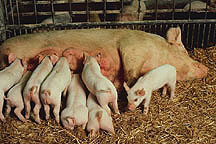This page has been archived and is being provided for reference purposes only. The page is no longer being updated, and therefore, links on the page may be invalid.
|
|
Genetic Marker Predicts Pig Litter Size
By Laura McGinnisDecember 27, 2006
Bigger is often better where litter size is concerned, especially when it comes to piglets.
Scientists with the Agricultural Research Service's (ARS) U.S. Meat Animal Research Center in Clay Center, Neb., have identified a genetic marker that could help pig breeders select animals for increased uterine capacity and litter size. This genetic discovery could give swine breeding a boost in efficiency.
How does the marker work? Research leader Jeffrey L. Vallet and his colleagues discovered a single nucleotide polymorphism, or SNP, in the erythropoietin receptor gene. The hormone erythropoietin binds to this gene and stimulates red blood cell production.
SNPs are genetic variations that provide information about an animal's genetic value and can be used in breeding programs. In studies on two unrelated swine populations, the scientists showed that this newly discovered SNP is associated with increased litter size, an important trait for the swine industry.
The SNP creates either a T or a C allele—an alternative form of a gene that controls traits such as hair or eye color in humans, for example. In swine, sows with the T allele have an average litter size that is one or two piglets greater than the average litter size of sows with the C allele, according to the study.
The T allele occurred at low frequency in the population studied, but is a beneficial genetic difference. So how can it be used to improve swine production?
Vallet and geneticist Bradley A. Freking have developed an assay to detect the SNP in individual sows. The ability to quickly identify the beneficial SNP allele could one day allow breeders to select sows with improved uterine capacity and litter size, thus increasing production efficiency.
ARS is the U.S. Department of Agriculture's chief scientific research agency.

